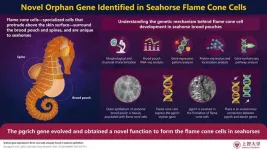(Press-News.org) More people are drinking milk alternatives made from plant sources such as oats, soy, or almonds, but do plant-based products deliver the same nutrition as cow’s milk? Results from a new study suggest that most don’t.
Cow’s milk is an important source of calcium and vitamin D, both of which are identified in the 2020-2025 Dietary Guidelines for Americans as nutrients of public health concern for underconsumption. Cow’s milk is also a major source of protein in the American diet.
To assess how the nutritional content of plant-based milk alternatives compares to that of cow’s milk, researchers examined more than 200 plant-based milk alternative products being sold in the U.S. in 2023 — many more products than were included in previous studies. Compared to cow’s milk, only 12% of the milk alternative products contained comparable or greater amounts of all three nutrients studied: calcium, vitamin D, and protein.
Abigail Johnson, assistant professor and associate director of the University of Minnesota School of Public Health Nutrition Coordinating Center, will present the findings at NUTRITION 2023, the annual flagship meeting of the American Society for Nutrition held July 22-25 in Boston.
“Our results provide evidence that many plant-based milk alternatives are not nutritionally equivalent to cow’s milk,” said Johnson. “Based on these findings, consumers should look for plant-based milk alternative products that list calcium and vitamin D as ingredients. They may also want to consider adding other sources of calcium and vitamin D to their diets.”
The University of Minnesota’s Nutrition Coordinating Center maintains a database of approximately 19,000 foods for assessing dietary intake in human research. “We know from our dietary assessments for nutrition studies that consumers are choosing more plant-based milk alternatives,” said Johnson. “This project aimed to increase the number of these milk alternatives available in the Nutrition Coordinating Center's database of foods.”
The study included nutrition information from nutrition facts labels and ingredient information for 233 plant-based milk alternative products from 23 different manufacturers. For each product, the researchers applied a nutrient calculation program to estimate full nutrient information. They then compared the nutritional content of different products within a category — for example, almond milk, oat milk, and soy milk — to each other and to cow's milk. Compared to dairy milk, just 28 of the plant-based alternatives had similar or more calcium, vitamin D and protein.
Almost two-thirds of the products included in the study were made from almonds, oats, or soy. The researchers found that 170 of the plant-based milk alternatives were fortified with both calcium and vitamin D and that the level of fortification tended to be similar to dairy milk. Specifically, 76% of the oat-based products, 69% of soy-based, and 66% of almond-based alternatives were fortified with both calcium and vitamin D. The median protein content was 2.0 grams (g) of protein per 240 milliliters (ml) of liquid, with a large variability that ranged from 0 to 12 g. Only 38 (16%) of the milk alternatives studied had a protein level greater than or equal to the 8 g per 240 ml found in cow’s milk. Soy- and pea-based alternatives were more likely to have higher protein.
“Our findings point to a need to ensure that consumers are aware that many plant-based milk alternative products in the marketplace today are not nutritionally equivalent to cow’s milk,” said Johnson. “Product labeling requirements and dietary guidance to the public are among the approaches that may be helpful in alerting and educating consumers.”
Next, the researchers plan to explore other nutrients in plant-based milk alternatives that make them different from cow’s milk. For example, many of these products contain fiber, suggesting that they may help meet some nutritional needs that cow’s milk doesn’t.
Johnson will present this research at 8:36 a.m. on Monday, July 24, during the Formulating for the Future: Food Science Approaches to Improving Human Nutrition Oral Session in the Sheraton Boston, Back Bay A (abstract; presentation details).
Please note that abstracts presented at NUTRITION 2023 were evaluated and selected by a committee of experts but have not generally undergone the same peer review process required for publication in a scientific journal. As such, the findings presented should be considered preliminary until a peer-reviewed publication is available.
About NUTRITION 2023
NUTRITION 2023 is the flagship meeting of the American Society for Nutrition and the premier educational event for nutritional professionals around the globe. NUTRITION brings together lab scientists, practicing clinicians, population health researchers, and community intervention investigators to identify solutions to today’s greatest nutrition challenges. Our audience also includes rising leaders in the field – undergraduate, graduate, and medical students. NUTRITION 2023 will be held July 22-25, 2023 in Boston. https://nutrition.org/N23 #Nutrition2023
About the American Society for Nutrition (ASN)
ASN is the preeminent professional organization for nutrition scientists and clinicians around the world. Founded in 1928, the society brings together the top nutrition researchers, medical practitioners, policy makers and industry leaders to advance our knowledge and application of nutrition. ASN publishes four peer-reviewed journals and provides education and professional development opportunities to advance nutrition research, practice, and education. Since 2018, the American Society of Nutrition has presented NUTRITION, the leading global annual meeting for nutrition professionals.
Find more news briefs and tipsheets at: https://www.eurekalert.org/newsroom/nutrition2023.
###
END
COLUMBUS, Ohio – When people who publicly reject COVID-19 vaccines later die from the disease, observers have complex reactions to their fates, a new study suggests.
While very few rejoice in the deaths of anti-vaxxers, some people believe those who are dogmatic against vaccines are deserving of worse outcomes – and that reaction is related to the political party affiliation and vaccination status of the person evaluating the anti-vaxxer.
Democrats and those who were vaccinated were more likely than Republicans and the unvaccinated to think anti-vaxxers who died got what they deserved ...
As artificial intelligence expands across more professions, robot preachers and AI programs offer new means of sharing religious beliefs, but they may undermine credibility and reduce donations for religious groups that rely on them, according to research published by the American Psychological Association.
“It seems like robots take over more occupations every year, but I wouldn’t be so sure that religious leaders will ever be fully automated because religious leaders need credibility, and robots aren’t credible,” said lead researcher Joshua Conrad Jackson, PhD, an assistant professor at the University of ...
July 24, 2023 – Characters with facial disfigurement have long been a recurring theme in films. Their characteristics and outcomes lend insights into perceptions of facial deformities and the effects of plastic surgery, reports a study in The Journal of Craniofacial Surgery under the guidance of Editor-in-Chief Mutaz B. Habal, MD, FRCS, FACS of Tampa, Florida. The journal is published in the Lippincott portfolio by Wolters Kluwer.
Movie characters who undergo successful plastic surgery to improve their facial appearance are more likely to have happy endings, according to the new research by Young Suk Kim, BA, and Kun Hwang, MD, PhD, of Armed Forces ...
A new study suggests that incorporating olive oil into your diet could help reduce the risk of dying from dementia. As many countries face rising rates of Alzheimer’s disease and other forms of dementia, the study offers hope that healthy lifestyle factors such as diet can help to prevent or slow the progression of these devastating conditions.
“Our study reinforces dietary guidelines recommending vegetable oils such as olive oil and suggests that these recommendations not only support heart health but potentially brain health, as well,” said Anne-Julie Tessier, RD, PhD, a postdoctoral fellow at the Harvard T.H. ...
Researchers report that blood levels of the omega-3 fatty acid docosahexaenoic acid (DHA) were inversely correlated with hearing difficulty in a new population-based cross-sectional study. Middle-aged and older adults with higher DHA levels were 8-20% less likely to report age-related hearing issues than those with lower DHA levels.
“Higher DHA levels have previously been found to be associated with a lower risk of heart disease, cognitive impairment, and death. Our study extends these findings to suggest a role for DHA in maintaining ...
Losing weight is often a goal for people with type 2 diabetes, which is strongly associated with being overweight or obese. However, it hasn’t been clear what dieting strategy works best for people with this metabolic disorder.
A new randomized controlled study of people with type 2 diabetes showed that study participants who restricted eating to between noon and 8 p.m. daily lost more weight than those who reduced their overall calorie intake by counting calories. Both dieting strategies produced similar improvements in blood sugar levels.
“Many people find counting calories very hard to stick to in the long term, ...
Caecilians are an elusive type of amphibian that primarily live underground and look like a cross between a worm and a snake. One of the few things that is known about caecilians is their unique method for feeding their young. Mothers produce a special layer of fatty skin tissue, which juvenile caecilians tear off with baby teeth that evolved specifically for that purpose.
A new study shows that skin-feeding does more than provide nutrients for young caecilians. It also helps the mother pass microbes from her skin and gut down to her young, inoculating them to jump-start a healthy ...
A technique that uses imaging technology as a guide can make radiation therapy safer for patients with prostate cancer by helping clinicians accurately aim radiation beams at the prostate while avoiding nearby tissue in the bladder, urethra, and rectum. That is the finding of a thorough analysis of all published clinical trials of the technique, called magnetic resonance–guided daily adaptive stereotactic body radiotherapy (MRg-A-SBRT). The analysis is published by Wiley online in CANCER, a peer-reviewed journal of the American Cancer Society.
By providing detailed images, MRg-A-SBRT can be used to adjust a patient’s radiation plan every ...
Children and adolescents living in food-insecure households had a 55% higher frequency of physician visits for mental health reasons than those with adequate food supplies, according to new research published in CMAJ (Canadian Medical Association Journal) https://www.cmaj.ca/lookup/doi/10.1503/cmaj.230332.
In 2021, almost 6 million people Canada, including 1.4 million children and adolescents younger than 18 years faced food insecurity; that is, inadequate food intake because of financial problems.
The study looked at population health survey data from the Canadian Community Health Survey on ...
Teleost fish encompass a diverse group, among which seahorses display a unique morphology. The characteristic spines and brood pouch seen in seahorses feature distinctive epithelial cells—called flame cone cells—covered by a mucous cap. However, these cells are not found in the barbed pipefish Urocampus nanus or the seaweed pipefish Syngnathus schlegeli, close relatives of the seahorse, belonging to the Syngnathidae lineage. While research has hypothesized the function of the flame cone cells, their evolutionary origins have remained a mystery.
Now, a team of scientists led by Assoc. Prof. Mari Kawaguchi and Prof. Shigeki Yasumasu from the Department of Materials ...


